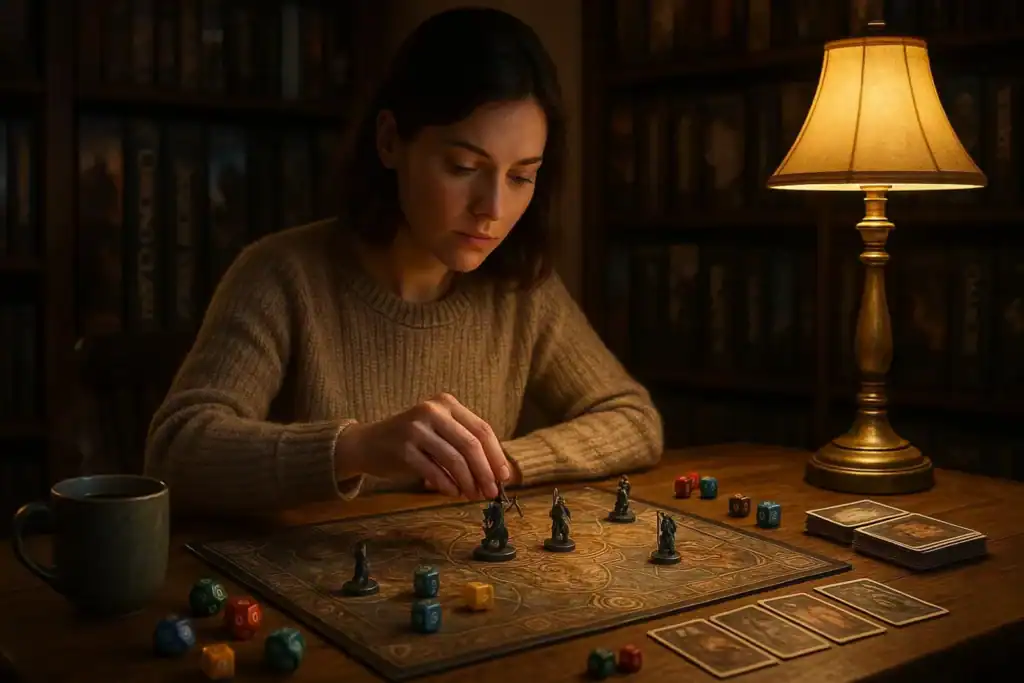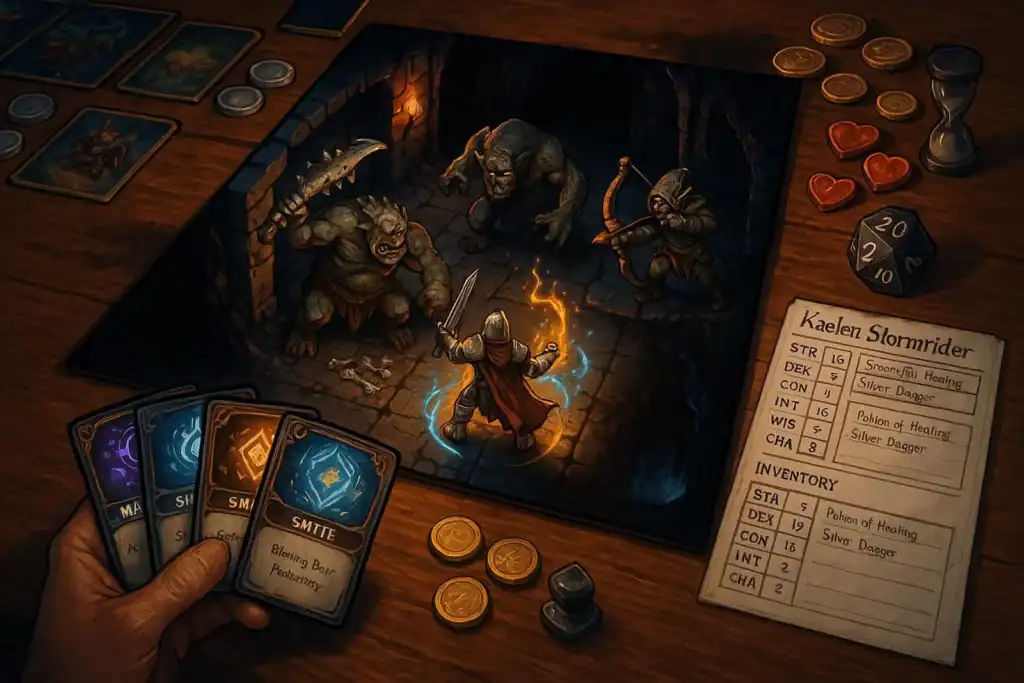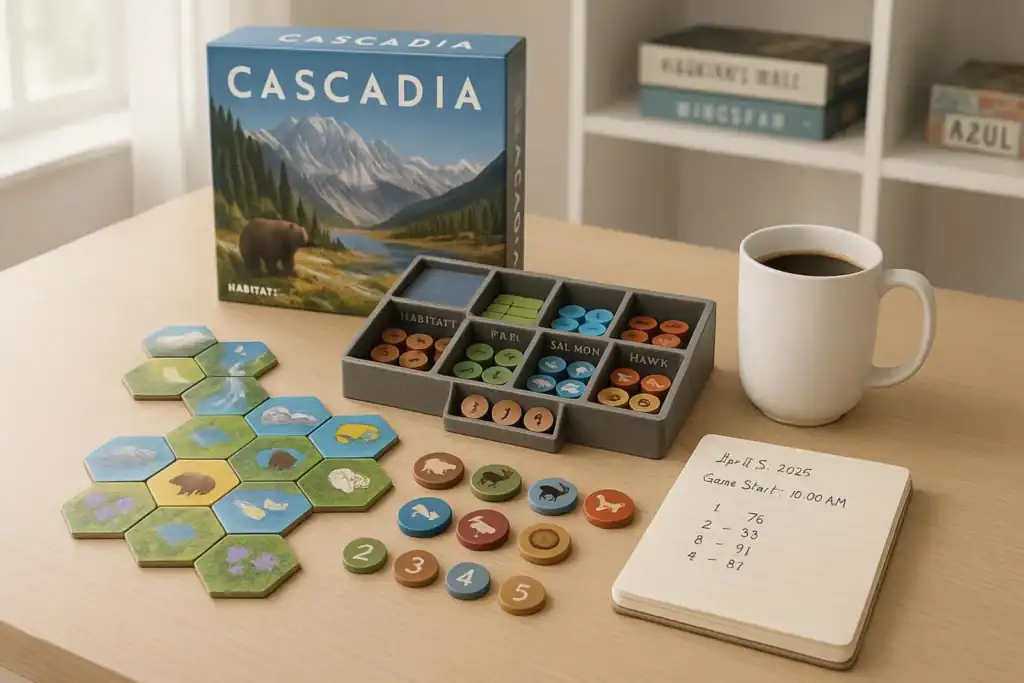What makes a board game great on your own? Solo board gaming has grown fast in recent years, moving far beyond simple solitaire into rich, immersive, and tough games built for one player. The best solo board games are not just multiplayer titles with a quick solo add-on; many are built from the ground up to give a strong one-player experience with deep strategy, engaging stories, and a real sense of achievement. Whether you want a calm evening of careful planning or a big campaign to get lost in, solo board games offer plenty of winners.
The appeal of solo gaming is the mix of personal challenge and escape. You play on your own schedule and at your own pace, without wrangling calendars or play styles. This guide explains what makes solo games work, looks at the different types you can try, and helps you find your next favorite one-player game.

What Makes a Board Game Ideal for Solo Play?
The shift from multiplayer to solo doesn’t always work. A good solo game needs parts that fit one player. It’s not just removing other people. The game needs to replace human roles and tension with a solid system that still feels lively and interesting.
Core Features of Solo Board Games
Great solo games use a well-built system that can act like other players or give you a strong challenge without them. Many use simple AI systems, often called “automas,” that behave like an opponent or partner. These systems should be easy to run but offer enough depth and surprise so each play feels new.
Beyond AI, many solo games shine by focusing on puzzles, story, or smart resource use. Clear goals, multiple ways to win, and a sense of growth keep you engaged. A strong theme helps too, so you can step into the setting and role without outside distractions.
Benefits of Playing Board Games Alone
- Play anytime: no scheduling, no waiting on others.
- Learn and master: focus on rules and strategy without teaching a group.
- Relax and reset: many find solo play calming and rewarding.
- Practice: learn complex games solo before bringing them to the table with friends.
Common Challenges of Solo Gaming
- Setup and cleanup can take time, especially for big games with many pieces.
- Running AI rules can feel like extra work if they’re fiddly.
- Less table talk: you may miss bluffing, trading, or surprise alliances.
- Social side: some players simply prefer shared moments with others.
The best solo designs reduce these issues with clear rules, smart AI flow, and tight gameplay loops.
Types of Solo Board Games
Solo board games cover many styles, from long adventures to quick logic puzzles. Knowing the main categories can help you pick what suits you best.
| Category | What You Do | Popular Examples |
|---|---|---|
| Cooperative Solo | Fight the game system to reach a goal | Spirit Island, Aeon’s End |
| Competitive Solo | Beat an AI score or opponent | Viticulture Essential Edition, The White Castle |
| Adventure/Campaign | Play linked stories with growth over time | Gloomhaven, Jaws of the Lion |
| Puzzle/Strategy | Optimize, deduce, and solve tight challenges | Turing Machine, Sprawlopolis, Orchard |
| Roll-and-Write/Card | Mark sheets or build decks/tableaus | Hadrian’s Wall, Cartographers, Friday, Race for the Galaxy |
Cooperative vs Competitive Solo Modes
Many solo modes are either cooperative or competitive. In cooperative solo, you work with the game system to stop threats or meet goals. Spirit Island is a top pick here, as you play spirits defending your island from invaders. Aeon’s End also shines, with tense boss battles where you and your virtual team fight scary nemeses.
Competitive solo has you face an AI to outscore or outplay it. Euro-style games like Viticulture Essential Edition use an automa to set a target score while you run a vineyard. The White Castle adds a tough AI for dice and worker placement fans, and some players use fan-made variants for a gentler challenge.
Adventure and Campaign Games for Solo Players
If you like long stories and long-term growth, try adventure and campaign games. These link scenarios with evolving plots and character upgrades over many sessions. Gloomhaven changed dungeon crawls with card-driven combat and a huge campaign that works well solo. Gloomhaven: Jaws of the Lion offers a smaller, easier start with the same core feel.
Other strong picks include Aeon Trespass: Odyssey, a huge co-op game with hundreds of hours of content, and Oathsworn: Into the Deepwood, praised for its story choices and miniatures combat. Robinson Crusoe: Adventures on the Cursed Island also stands out with tough survival scenarios that tell a broader tale of grit and discovery.

Puzzle and Strategy Solo Experiences
If you want a brain workout, puzzle and strategy games will scratch that itch. These focus on optimization, deduction, and clever use of limited tools. Turing Machine is pure logic, asking you to narrow down numbers with sparse clues. Sprawlopolis is a tiny 9-card city builder where changing scoring goals force you to adapt every game.
Orchard: A 9 card solitaire game proves small games can still be rich. It’s a quick tile-layer about stacking fruit trees for high scores. These games are great for short sessions or for sharpening your tactical thinking.
Roll-and-Write and Card-Based Solo Games
Roll-and-writes and card games are favorites for solo players because they’re easy to set up and often small. In roll-and-writes, you roll dice or flip cards, then mark results on a sheet. Hadrian’s Wall puts you in charge of building and managing a Roman outpost, with satisfying combos and bigger sessions. Cartographers offers a calmer vibe as you draw map shapes to score, a bit like turn-based Tetris.
Card-based solo games include deck-builders and tableau games. Friday, based on Robinson Crusoe, asks you to tune your deck to survive on an island. Race for the Galaxy has an excellent solo bot with The Gathering Storm expansion, packing lots of replay into a small box. These travel well and play fast while still offering real depth.
How Do Solo Modes Work in Board Games?
The magic of a good solo mode comes from smart ways to mirror multiplayer tension without human players. Designers often do this with simple but clever AI rules.
What Is an Automa or Artificial Opponent?
An “automa” or artificial opponent drives solo play in many games. Instead of just chasing a high score, it acts like a real player using set rules. Some automas are simple decks that tell you what the opponent does, like in Race for the Galaxy. Others use flowcharts or decision trees.
In Tapestry, an AI by Automa Factory gives a nuanced challenge with clear steps and goals. A good automa is quick to run but still deep enough to push your planning and keep you guessing. The new solo AI in The Castles of Burgundy shows how a well-fitted bot can lift a game’s solo appeal a lot.
Are Dedicated Solo Games Better Than Multiplayer Games with Solo Modes?
There’s ongoing debate, and it often comes down to taste and how well the solo mode is made. “True solitaire” games like Under Falling Skies or Nemo’s War are built only for one player. They can feel tight and focused, with every piece serving the solo experience. Many deliver a sharp puzzle or strong story with no compromises.
But many multiplayer-first games also deliver great solo play if their solo rules and AI are strong. Marvel Champions: The Card Game and Arkham Horror: The Card Game are standouts here. While you can play them with friends, their solo modes still give deep strategy and rich theme. The key factor is quality: a weak solo mode can feel tacked on, while a well-made one can make the game a solo favorite.
What Are the Best Solo Board Games Available?
With so many good options, “best” depends on your taste, but some titles show up on many top lists and earn steady praise. Below are highlights-some older favorites and some fresh stars.
Highly Rated Classic Solo Board Games
Spirit Island stays near the top for many players. You play as spirits defending an island from invaders, with deep strategy and a standout theme. Mage Knight: Ultimate Edition is another big name-complex and demanding, it has become a solo staple thanks to its depth and long sessions.
Other classics include Race for the Galaxy, which gains a strong solo bot with The Gathering Storm. Friday has been a go-to solo deck-builder for years, proving a small game can have huge replay. And Robinson Crusoe: Adventures on the Cursed Island offers a hard but rewarding survival story with varied missions.
Standout Modern Solo Board Games
Marvel Champions: The Card Game has wowed solo players with fast, modular boss fights starring famous heroes. Regular expansions keep it fresh. Final Girl is another hit, putting you in a horror showdown as the last survivor, with high tension and lots of replay.
Slay the Spire: The Board Game brings the beloved video game to the table with a strong solo deck-building feel. Voidfall, a heavy 4X game, pulls off solo with a strong AI and crunchy decisions. For a lighter change of pace, Cascadia offers calm tile-laying that plays very well solo.
Award-Winning and Critically Acclaimed Solo Games
Many of the games above have earned major awards. Spirit Island and Gloomhaven are praised for bold design and rich play. Arkham Horror: The Card Game gets frequent nods for its gripping Lovecraftian story and tough, branching campaigns.
Newer standouts include The Castles of Burgundy with its praised solo AI, and Hadrian’s Wall with engaging roll-and-write play and a free solo campaign. These show how far solo design has come, offering tough, rewarding play for one.
How to Choose the Right Solo Board Game for You
Sorting through so many solo games can feel like exploring a big map. The trick is to know what you enjoy and match a game to your taste and time.
Game Length, Complexity, and Theme
These three points matter most for fit. For game length, do you want short puzzles like Orchard or Sprawlopolis, or long sagas like Gloomhaven or Aeon Trespass: Odyssey? Some, like Hadrian’s Wall, run longer than most roll-and-writes if you want a deeper session with a lighter core.
For complexity, are you ready for heavy rules and deep planning, like Mage Knight or Gaia Project? Or do you prefer a gentler start, like Cascadia or Wingspan? Try hard games when you feel up to it, but pick something lighter when that suits your mood.
For theme, choose what excites you: defend a fantasy setting, explore space, run a vineyard, or face cosmic horror. The theme should speak to you because you’ll live in it for many turns. Whether it’s the stark survival of This War of Mine: The Board Game, the heroics of Marvel Champions, or the political history of Pax Pamir, a theme you love will boost your fun.
Replay Value and Component Quality
Replay value matters a lot, especially for bigger buys. Look for modular setups, many scenarios, varied characters, and unpredictable AI behavior. Imperium: Classics has many civilizations and a varied AI, giving it long legs. Ongoing content for games like Marvel United or Aeon’s End also keeps things fresh.
Component quality doesn’t change rules but adds to the feel. Good art, sturdy cards, clean inserts, and nice miniatures make setup and play more pleasant. Some titles, like base Terraforming Mars, are loved despite mixed components, while Oathsworn: Into the Deepwood and the Robinson Crusoe Collector’s Edition get praise for their production. Decide if you prefer simple and tidy or a flashy table presence.
Accessibility for New and Experienced Players
If you’re new to solo gaming, start with approachable picks. Clear rulebooks, simple turns, and steady learn-as-you-go flows help a lot. A beginner’s guide suggests building a small library of multiplayer games that also have strong solo modes so you can play both ways. Small, quick games like Sprawlopolis or Gate are great for learning or passing time.
Veterans may want games that push planning and depth. Heavy Euros like A Feast for Odin test decision-making, while big LCG campaigns like Arkham Horror: The Card Game deliver long stories. The right game matches how long you want to play, the rules weight you enjoy, and the themes you like.
Tips to Improve Your Solo Board Game Experience
Getting started with solo play is fun on its own, and a few simple habits can make good games even better.
Organizing a Solo Gaming Session
Prep helps. Before setup, skim the rules for solo mode or the automa. This cuts down on flipping through the book mid-game. If you have space, keep a “solo zone” where a game can stay on the table for a day or two so you can return without packing it away.
Set the mood. For scary games like Final Girl, a horror soundtrack adds to the vibe. For calm games like Cartographers, soft music and a coffee create a relaxing space. Treat your solo time as a small event just for you.

Optimizing Setup Time and Space
Big games can take a while to set up and put away. Try storage boxes, baggies, or custom inserts to keep parts sorted. Pre-bag scenarios or player pieces to speed things up.
Think about table space too. Some games like Gloomhaven or Kingdom Death: Monster need a lot of room. If your space is tight, go with small-box options like ROVE or Sprawlopolis. For larger games, use component trays and a tidy layout to manage the footprint.
Finding Community and Sharing Strategies
Solo play doesn’t mean you’re alone. Online groups, especially the solo guilds on BoardGameGeek, are full of tips, friendly chat, and fan-made content. You’ll find strategy threads, free campaigns (like the Solo Project PEGASUS for Marvel United), and house rules that might fit your style.
Sharing your wins, losses, and ideas adds a social layer to your hobby. You’ll hear about new games, learn smart tricks, and enjoy the shared excitement of tough scenarios and clever plays.
Popular Questions About Solo Board Gaming
As solo play grows, many players ask similar questions about why it’s fun and how it works best.
Are Solo Board Games Fun and Engaging?
Yes. The idea that you need a group to enjoy board games doesn’t hold up today. The best solo games are carefully built to be great for one player. They bring deep puzzles, strong stories, and a clear sense of personal achievement that can match or beat group sessions.
Games like Spirit Island and Marvel Champions: The Card Game are loved for their tight gameplay and theme. The fun comes from the mental challenge, the story that unfolds, and the joy of mastering a tricky system. Many players find solo gaming both relaxing and stimulating.
Do Solo Board Games Offer Enough Replay Value?
This is a common question, especially given the time and cost of bigger games. The short answer for many top solo titles is yes. Designers plan for replay and use tools that keep each game fresh.
- Modular setups: different scenarios, enemies, and characters.
- Randomness that matters: card draws and dice that force you to adapt.
- Campaigns and legacy: branching paths and evolving content.
The 7th Continent and The 7th Citadel offer huge maps with plenty to find over many plays. LCGs like Arkham Horror: The Card Game and Marvel Champions add steady new content and mix-and-match decks. Even tiny games like ROVE and Sprawlopolis stay fresh with shifting goals and tight choices.
Can You Play Multiplayer Games Solo with House Rules?
You can often adapt multiplayer games for solo, but results vary. Co-op games work well “multi-handed,” where you control more than one character. Reviewers also use this to learn games, like in the “Top 10 Solo Board and Card Games of 2024,” which used multi-handed runs for Marvel United: Project PEGASUS Campaign.
Competitive games are harder to adapt without a solid automa. Running your own “opponent” can lead to bias or a weak challenge. Trying house rules can be fun, but for the best solo play, it’s usually better to pick games with official solo rules or those built for one from the start.
Final Thoughts on the Best Solo Board Games
Solo board gaming is richer and more varied than many expect. It mixes personal challenge with strong stories and deep strategy, all on your own schedule. The rise of solo play shows how creative designers are and how much players value flexible, engaging games that fit busy lives.
The best solo games connect directly with you. They offer an experience where you can be the hero, the planner, the explorer, or the survivor-just you and the game. As new designs arrive, expect even smarter solo systems and bold ideas. Clear a space, pick a game, and enjoy the special satisfaction that only great solo board games can deliver.








































